Reading the Chunksters discussion

This topic is about
Moby-Dick or, The Whale
Moby Dick
>
Moby Dick - Chapters 82-105
date newest »
newest »
 newest »
newest »
 Chapters 85-86
Chapters 85-86Chapter 85 - The Fountain
In this chapter Ishmael notes that even a whale's spout is subject to debate, and he notes that whales can hold their breath for over an hour, and that air is taken in through the spout. He also notes the different views about how whales expel water through the spout, with some stating that it is just water in mist form and others believing it is harmful and acidic.

Chapter 86 - The Tail
Ishmael describes the whale tail in this chapter, noting that it is what most often harms men. He notes that the tail has power and grace and represents the whale’s attempts to reach to heaven.
 Chapter 87 - The Grand Armada
Chapter 87 - The Grand ArmadaThe Pequod comes across a herd of sperm whales swimming in a circle (aka the Grand Armada), but when the ship starts chase it is followed by pirates. The Pequod escapes and continues pursuing the whales, and crew members 'drug' them by attaching lines with large blocks of wood attached. The whalemen also try to mark the whales with poles so they can capture them later, but they only succeed in capturing one.
 Chapters 88-90
Chapters 88-90Chapter 88 - Schools and Schoolmasters
In this chapter Ishmael tells us that there are two types of groups of whales at sea - young females followed by an older male and young males that tend to be rather violent (probably because the older whale has all of the ladies).
Chapter 89 - Fast-Fish and Loose-Fish
In this chapter Ishmael talks about whale law, which seems to be pretty spare at the time. It basically amounts to the rule that Fast Fish are those that have been claimed (have a marker or is connected to the pursuer) and Loose Fish are up for grabs. He discusses the general notion that possession can automatically mean ownership, and that nations themselves can be fast or loose fish. He also notes that the reader himself is both a fast and a loose fish—bound to some conventions in life, and free of others.
Loose fish:
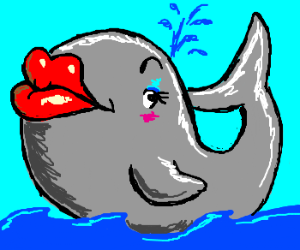
Chapter 90 - Heads or Tails
In this chapter Ishmael discussing the fishing laws of England that state that any whale caught on its coast is fast and belongs to England. The head must be given to the king and the tail to the queen, leaving nothing for the hunter.
 Chapters 91-92
Chapters 91-92Chapter 91 - The Peqoud meets the Rose-Bud
The Pequod meets the Rose-Bud, which inexplicably reeks. Turns out that it is carrying a stinking whale that died at sea and another one that died of indigestion. Yummy. The Captain of the RB thinks the whales are worth something even though the sailors have told him otherwise. However, Stubb knows that the second whale might contain ambergris, a valuable substance found in the intestines of sick whales. The sailors convince the Captain to dump the whales to avoid spreading infection and Stubb takes the whale and the Pequod collects the ambergris.
Chapter 92 - Ambergris
Ishmael explains that ambergris is used for perfume and comes from whale intestines. Smells divine.
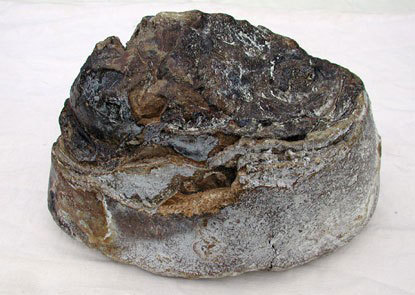
 Chapter 93 - The Castaway
Chapter 93 - The CastawayPip subs as an oarsman in Stubb's boat but is scared when a whale knocks into the boat and jumps out. The crew has to release the whale to rescue Stubb and they tell him not to jump out again. Sure enough, he does and they leave him in the ocean a bit to teach him a lesson. Ishmael thinks this experience has taught Pip "divine wisdom" but the rest of the crew thinks it just made him go crazy.
 Chapters 94-98
Chapters 94-98Chapter 94 - A Squeeze of the Hand
This chapter about Ishmael squeezing spermaceti all day kind of grossed me out. He seemed to be really into it.
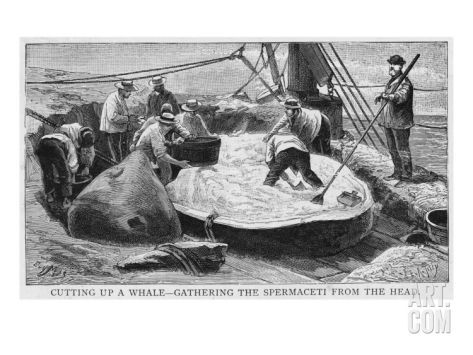
Chapter 95 - The Cassock
If you didn't pick up on this whale cassock = whale penis. I'm not posting a picture for this one. Ishmael compares it to a clergyman's dress because it has mysticism attached to it (why?). Also, crew members that are slicing blubber wear the black 'pelt' of the skin as a guard. Tempting.
Chapter 96 - The Try-Works
The try-works are what boil the blubber down into oil. Ishmael compares the process to darkness and evil.
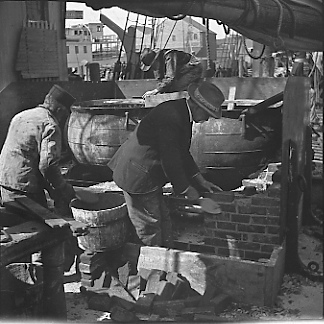
Chapter 97 - The Lamp
Unlike merchant ship sailors, whale men always have light because they have free access to the oil for their lamps.
Chapter 98 - Stowing Down and Clearing Up
In this chapter Ishmael discusses how whale oil is processed.
 Chapter 99 - The Doubloon
Chapter 99 - The DoubloonThis was an odd chapter in which various crew members examine the doubloon that Ahab nailed to the mast. Ahab sees the devil in the doubloon, Starbuck thinks it reveals God's mercy, Stubb sees sex jokes, and Pip thinks the doubloon means the crew will reach its demise when they find Moby Dick. Meanwhile Queequeg is studying his grammar.
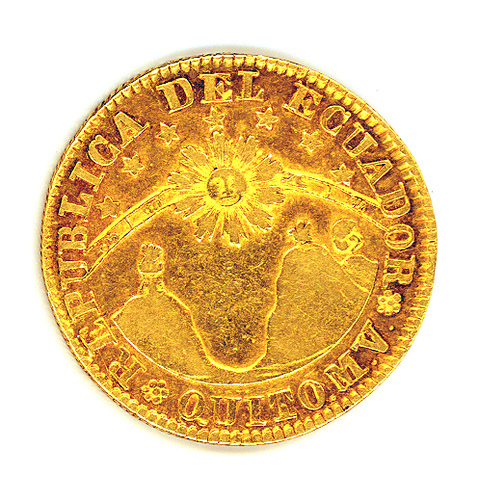
 Chapters 100-101
Chapters 100-101Chapter 100 - Leg and Arm - The Pequod, of Nantucket, meets the Samuel Enderby, of London
In this chapter the Pequod meets the SE that has also encountered Moby Dick. The captain has an ivory arm due to an arm lost in pursuit of Moby Dick, although it had to be removed due to a harpoon injury sustained during the chase. The other captain has no interest in hunting Moby Dick further, and Ahab is angry that he doesn't learn more about the whale's location.
Chapter 101 - The Decanter
In this chapter Ishmael talks about his time on the Sammy where they served a ton of beef and booze. Ishmael discusses the enormous amounts of provisions Dutch and English whalers brought on board, unlike the Pequod.
 Chapters 102-105
Chapters 102-105Chapter 102 - A Bower in the Arsacides
In this chapter Ishmael notes that he has measured a whale's skeleton before.
Chapter 103 - Measurement of the Whale's Skeleton
In this chapter we learn that the Tranque sperm whale’s skeleton measured about 72 feet in length but that the whale is much larger due to the enormous layer of blubber. Ishmael comments that the skeleton shows only the shadow of the greatness and sublimity of the whale itself.
Chapter 104 - The Fossil Whale
Oh dearie me, Ishmael. Honestly. Now he is describing the fossil whale from an “archaeological, fossiliferous, and antediluvian point of view.”
Chapter 105 - Does the Whale's Magnitude Diminish? Will He Perish?
Ishmael considers two questions in this chapter: 1. Have whales increased or decreased in size since antiquity. Answer: I don't know. 2. Could whaling cause whales to go extinct? Answer: Possibly, but not at the current level of whaling.
 Chapter 86 The Tail
Chapter 86 The TailSo Ishmael examines the whale in detail from head to tail, and at the end admits that he still cannot really understand him, as there is so much unknowable that lies beneath "Dissect him how I may, then, I but go skin deep; I know him not, and never will."
 Chapter 85
Chapter 85 Ishmael succinctly describes the whale (the book, and the author).
"He is ponderous and profound."
 Dan wrote: "Chapter 85
Dan wrote: "Chapter 85 Ismael succinctly describes the whale (the book, and the author)
He is ponderous and profound."
LMAO! And, with vapor rising from his head 🙄😄.
 Dianne wrote: "Chapters 85-86
Dianne wrote: "Chapters 85-86Chapter 85 - The Fountain
In this chapter Ishmael notes that even a whale's spout is subject to debate, and he notes that whales can hold their breath for over an hour, and that ai..."
Excepting its stomach, we now know the whale from head to fluke. It's a lot of detail, but having it gives the story drama. Not just here, but in all parts of the book.
 Ch.99 The Doubloon: 'And some certain significance lurks in all things, else all things are little worth, and the round world itself but an empty cipher'.
Ch.99 The Doubloon: 'And some certain significance lurks in all things, else all things are little worth, and the round world itself but an empty cipher'.I liked the way this chapter shows the subjectivity of readings as various characters interpret the images on the coin in different ways.
It seems that Ishmael, too, through all those delvings into the whale is searching for some kind of ultimate significance - but, as Pamela notes above #11, it remains mysterious and unknown. Sometimes a whale may just be a whale ;)
 Dianne wrote: "Chapters 94-98
Dianne wrote: "Chapters 94-98Chapter 94 - A Squeeze of the Hand
This chapter about Ishmael squeezing spermaceti all day kind of grossed me out. He seemed to be really into it.
I enjoyed this chapter very much. A bit masturbatory, a bit homo-erotic, I thought. Definitely sensual. This is another part of the story that made me giggle like a school girl.
Chapter 95 - The Cassock
If..."
 Pamela wrote: "Chapter 86 The Tail
Pamela wrote: "Chapter 86 The TailSo Ishmael examines the whale in detail from head to tail, and at the end admits that he still cannot really understand him, as there is so much unknowable that lies beneath "D..."
it's really kind of astounding with all of the research that he has done! What is Melville trying to convey by relating this? That all creatures are ultimately unknowable?
 Dan wrote: "Chapter 85
Dan wrote: "Chapter 85 Ishmael succinctly describes the whale (the book, and the author).
"He is ponderous and profound.""
Ponderous is such a great word.
hey, do these pants make me look ponderous??
 I'm not sure one can just LOOK ponderous.
I'm not sure one can just LOOK ponderous.Moby Dick IS ponderous - the whale has weight, he's heavy, making his movements ponderous.
So unless pants are themselves very heavy, or the legs they cover are heavy, (or be) pants won't make one look ponderous.
 Ponderous is the PERFECT description of whales. Or elephants. It moves the way it moves because of its size.
Ponderous is the PERFECT description of whales. Or elephants. It moves the way it moves because of its size. The "pondering" connotations are there, too. And ponder has a larger than just thinking meaning—again, more than just thinking, to do with the size/and extra considerations of the thought. It doesn't (although it may) mean bigger thoughts, but thinking more thoroughly. It's the thinking that gets larger and takes longer, not the idea.
 Dan wrote: "Ponderous is the PERFECT description of whales. Or elephants. It moves the way it moves because of its size.
Dan wrote: "Ponderous is the PERFECT description of whales. Or elephants. It moves the way it moves because of its size. The "pondering" connotations are there, too. And ponder has a larger than just thinkin..."
My sister takes her family to see A Christmas Carol every year. Since they were wee ones, her daughters have known and used the word "ponderous," as in "ponderous chains."
 Once upon a Midnight dreary,
Once upon a Midnight dreary,As I pondered weak and weary
Over yet another chapter of detailed, whalien lore.
I generally enjoy the informational chapters, but I prefer them to be spaced out a little more. This section had one after another, after another, after another. I found I often had to turn flukes.
 Paula wrote: "Once upon a Midnight dreary,
Paula wrote: "Once upon a Midnight dreary,As I pondered weak and weary
Over yet another chapter of detailed, whalien lore.
I generally enjoy the informational chapters, but I prefer them to be spaced out a lit..."
Oh, Paula, I do agree, up till this reading. I've read it before, and was initially successful after countless attempts. And that time, I admit I skimmed some of the informational portions. But this time, I gained a new appreciation for them. I had to keep recharging my Kindle every couple of days, rather than once a week. I found myself settling into bed rather looking forward to falling asleep whilst reading one of these chapters. Instead of girding my loins as I did before, I let it happen. I settled in, relaxed, and let the many, many words soak in. I believe this is the second time I've read MD. It was much better. And those verbose informational chapters were so much richer for me, because the following day I had to back up a bit and re-read portions.
You've been quite enthusiastic about this book. You're allowed to feel the dragging. Remember, Ishael tells us a whaling trip lasted two to four years. Think of what it felt like to be on the ocean, no land in sight. Just the ship, sea, and sky for years. I think these chapters help convey the tedium the whalers experienced. They got tired of it. It's OK if you get tired of it, too.
 Dan wrote: "Ponderous is the PERFECT description of whales. Or elephants. It moves the way it moves because of its size.
Dan wrote: "Ponderous is the PERFECT description of whales. Or elephants. It moves the way it moves because of its size. The "pondering" connotations are there, too. And ponder has a larger than just thinkin..."
You know it's a good point Dan, and illuminates how Melville was really so brilliant. A single word, just one word in this book can be mulled about and interpreted and has so many meanings, and all are perfectly apt!
I really do like the word ponderous though.
 Hummingbirder wrote: "Dan wrote: "Ponderous is the PERFECT description of whales. Or elephants. It moves the way it moves because of its size.
Hummingbirder wrote: "Dan wrote: "Ponderous is the PERFECT description of whales. Or elephants. It moves the way it moves because of its size. The "pondering" connotations are there, too. And ponder has a larger than ..."
that is priceless!
 Paula wrote: "Once upon a Midnight dreary,
Paula wrote: "Once upon a Midnight dreary,As I pondered weak and weary
Over yet another chapter of detailed, whalien lore.
I generally enjoy the informational chapters, but I prefer them to be spaced out a lit..."
this one was a stretch, and then, although this is covered in the next section, the finale was fast and furious. Why, at this point, was there not more build up to the conclusion? I understand setting the context, but agree that it dragged on a bit here (for me).
 "his vast, mild head overhung by a canopy of vapour, engendered by his incommunicable contemplations, and that vapour—as you will sometimes see it—glorified by a rainbow, as if Heaven itself had put its seal upon his thoughts." from "Moby Dick: Complete and Unabridged (Illustrated with Included Audiobook)" Chapter 85
"his vast, mild head overhung by a canopy of vapour, engendered by his incommunicable contemplations, and that vapour—as you will sometimes see it—glorified by a rainbow, as if Heaven itself had put its seal upon his thoughts." from "Moby Dick: Complete and Unabridged (Illustrated with Included Audiobook)" Chapter 85I love this quote as this is my image of whales.....calm beautiful magnanimous creatures minding their own business in the vast ocean. I've had a hard time with the chapter that are detailing the hunt and killing of whales. It was nice to see some time spent on their beauty.
 Dianne wrote. “...finale was fast and furious.”
Dianne wrote. “...finale was fast and furious.”Do you promise? I’ve finally made it to ch 106 but am hesitant to say I’m almost done. I really enjoyed the meetings with the other ships but I’ve had my fill of Whale Anatomy 101.
Stephanie
 Stephanie wrote: "Dianne wrote. “...finale was fast and furious.”
Stephanie wrote: "Dianne wrote. “...finale was fast and furious.”Do you promise? I’ve finally made it to ch 106 but am hesitant to say I’m almost done. I really enjoyed the meetings with the other ships but I’ve h..."
Stephanie, The end is incredibly fast and furious. It's true the whale anatomy goes on and on, but that's his wordiness. All the things you've learned about whales and ships, you need that information to understand the ending. It will leave you breathless.





Chapter 82 - The Honor and Glory of Whaling
In this chapter Ishmael discusses a number of figures that have been whalemen - Perseus, Hercules, and St. George. He seems to be comparing whale men to mythological heroes, and thereby enhancing his own status.
from wiki...
Perseus:
In Greek mythology, Perseus, the legendary founder of Mycenae and of the Perseid dynasty of Danaans, was, alongside Cadmus and Bellerophon, the greatest Greek hero and slayer of monsters before the days of Heracles. He beheaded the Gorgon Medusa for Polydectes and saved Andromeda from the sea monster Cetus. He was the son of the mortal Danaë and the god Zeus, and the half-brother and great grandfather of Heracles.
Hercules:
Hercules is a Roman hero and god. He was the equivalent of the Greek divine hero Heracles, who was the son of Zeus (Roman equivalent Jupiter) and the mortal Alcmene. In classical mythology, Hercules is famous for his strength and for his numerous far-ranging adventures.
St. George:
Saint George, according to legend, was a Roman soldier of Greek origin and officer in the Guard of Roman emperor Diocletian, who was sentenced to death for failing to recant his Christian faith.The Saint George and the Dragon legend describes the saint taming and slaying a dragon that demanded human sacrifices; the saint thereby rescues the princess chosen as the next offering.
Chapter 83 - Jonah Historically Regarded
In this chapter Ishmael relays whaleman Sag-Harbor's dissection of the story of Jonah and his conclusion that a whale couldn't actually swallow a person, and even if it could, a person couldn't live in a whale's stomach.
Chapter 84 - Pitchpoling
In this chapter Stubb kills a whale by pitchpoling, in which he takes a smaller, shorter harpoon, rests it with the tip upward on his palm, and launches it “in a lofty arch” like a javelin into the sky—the spear then lands in the whale, stabbing it deeply. This chapter also discusses the oiling of a harpoon's boat bottom to make it faster.